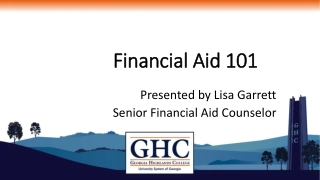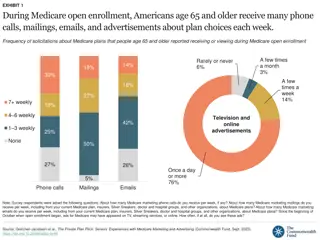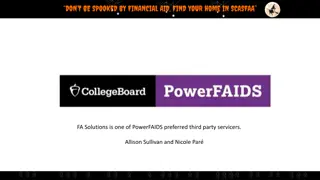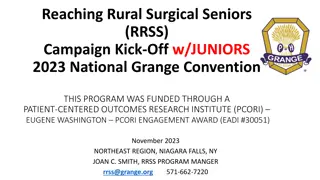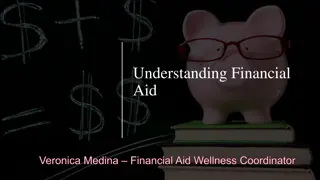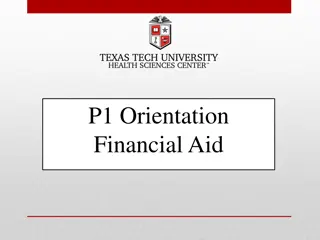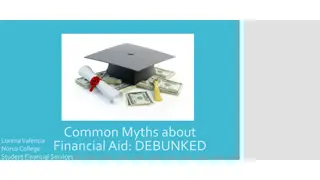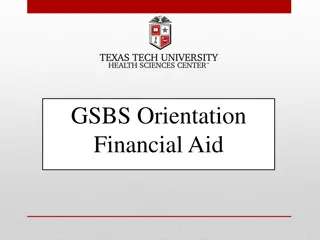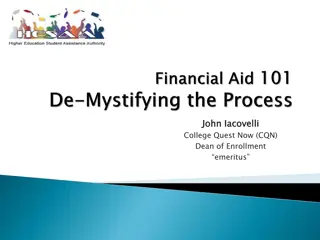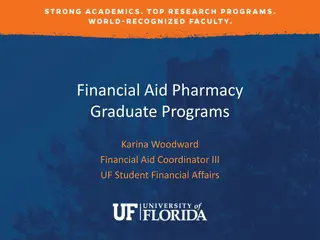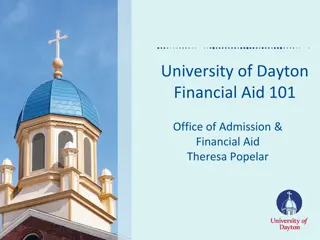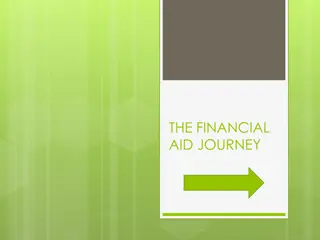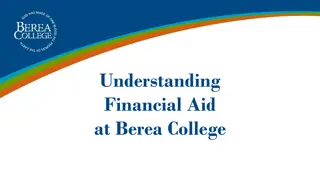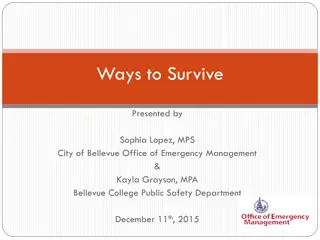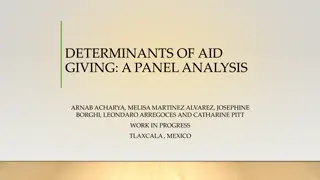Comprehensive Financial Aid Workshop for High School Seniors and Parents
Learn about essential financial aid terms, applications like FAFSA and CSS Profile, understanding financial need, college costs, and sources/types of financial aid. Get insights on scholarships, grants, loans, and employment opportunities. Equip yourself for navigating the complex world of funding higher education.
Download Presentation

Please find below an Image/Link to download the presentation.
The content on the website is provided AS IS for your information and personal use only. It may not be sold, licensed, or shared on other websites without obtaining consent from the author. Download presentation by click this link. If you encounter any issues during the download, it is possible that the publisher has removed the file from their server.
E N D
Presentation Transcript
FINANCIAL AID WORKSHOP FOR HIGH SCHOOL SENIORS AND PARENTS Sponsored by: Your School Name Here and The SC Association of Student Financial Aid Administrators
Applications Free Application For Federal Student Aid(FAFSA) Used by all schools; deadlines vary Institutional Scholarship Application Required by some schools CSS Profile Required by some schools to apply for institutional aid
Financial Aid Terms Cost of Attendance (COA) The estimated cost of tuition, fees, room, board, books, transportation and personal expenses at each school; includes indirect costs Student Aid Index (SAI) The student s approximate amount of financial resources to contribute toward their postsecondary education, generated by the data reported on the FAFSA. Financial Need Cost of Attendance (COA) minus Student Aid Index (SAI) minus Other Financial Assistance (OFA) equals need. (COA SAI OFA = Need) Caution: o o Your SAI is not the amount you will pay. Financial aid may not cover your financial need.
Financial Need If your Student Aid Index (SAI) is 20,000, your need will be different at each school. School A School B School C Cost of Attendance $60,000 $30,000 $15,000 Student Aid Index 20,000 20,000 20,000 Financial Need $40,000 $10,000 $0
Sample College Costs A Private Four-Year $51,000 A Public Four-Year $15,000 A Public Two-Year $4,000 Tuition and Fees Food and Housing $14,000 $13,000 $10,000 (Off-campus, not with parents) TOTAL $65,000 $28,000 $14,000 Other expenses: books, laptop, personal/medical, and transportation These samples are for illustrative purposes only. Search for Cost of Attendance on your college s website.
Sources of Financial Aid Federal State School Donors(local & national) Military Other Agencies
Types of Financial Aid Scholarships Gift aid based on merit (academics, performance, leadership) Grants Gift aid based on financial need (income, assets) Loans Self-help aid that must be repaid Employment Self-help aid that is paid based on hours worked
Scholarships University Scholarships Vary by school Donor/Outside Scholarships Local and national businesses and agencies Palmetto Fellows Scholarship* LIFE Scholarship* Hope Scholarship* *Students must meet SC residency requirements. *Students can receive only one type of state scholarship. * Criteria for eligibility and renewal are subject to change.
Palmetto Fellows Scholarship $6700 Rank in top 6% of high school class (sophomore, junior or senior year) Score 31 ACT composite or 1400 SAT Earn 3.5 GPA on uniform grading policy (UGP) Student applies through school counselor To retain: Earn 30 credit hours EACH year Earn 3.0 GPA at home institution AP/IB classes do not count in credit hours for renewal Students who lose the Palmetto Fellows Scholarship may still be eligible for the LIFE Scholarship
Palmetto Fellows Scholarship Alternate Criteria Students who do not meet the 6% requirement may still be designated a Palmetto Fellow if they: Score 31 ACT composite or 1400 SAT and Earn 4.0 GPA on uniform grading policy (UGP)
LIFE Scholarship for 4-Year Colleges $5000 Two out of three: Graduate in top 30% of high school class Score a minimum 22 ACT composite or 1100 SAT Graduate with a minimum 3.0 GPA on uniform grading policy (UGP) No application process; awarded by college To retain or regain: Earn AVERAGE of 30 credit hours/year Earn 3.0 LIFE GPA AP/IB classes count in credit hours for renewal
LIFE Scholarship for 2-Year Colleges $5,000 OR up to tuition/fees and $300 towards books Graduate with a minimum 3.0 GPA on uniform grading policy (UGP) No application process; awarded by college To retain: Earn AVERAGE of 30 credit hours/year Earn all-college 3.0 GPA AP/IB classes count in credit hours for renewal Not renewable for students enrolled in certificate or diploma programs
Math and Science Enhancement Applies to certain math and science majors at four-year colleges Applies to second, third and fourth years LIFE increases from $5,000 to $7,500 Palmetto Fellows increases from $6,700 to $10,000 Student must complete 14 hours of math, science or combination in the first year AP/IB classes count towards the Enhancement requirements (but not the renewal requirements for Palmetto Fellows)
Hope Scholarship $2,800 Four-year institutions only Graduate with a minimum 3.0 GPA on uniform grading policy (UGP) No application process; awarded by college Non-renewable To gain LIFE Scholarship in second year: Earn 30 credit hours/year Earn all-college 3.0 GPA
Grants All require submission of FAFSA Federal Pell Grant Federal Supplemental Educational Opportunity Grant (SEOG) South Carolina Tuition Grant (SCTG) For private/independent schools South Carolina Need-Based Grant (SNBG) For public/state schools South Carolina Lottery Tuition Assistance Program (LTAP) For two-year schools; not need based; certain majors may qualify for additional funding from SC WINS
Federal Grants Pell Grant $7,395 maximum for 2023-24 Supplemental Educational Opportunity Grant (SEOG) Supplement to the Pell Grant Limited funding; based on deadline Amounts will vary by school
State Grants SC Tuition Grant (SCTG) For private/independent institutions only Eligibility based on FAFSA by June 30 Maximum for 2023-2024 is $4,800 First time Freshman must have obtained a high school diploma or its equivalent and be fully admitted as a degree-seeking student based on the college s academic requirements for admission Returning students must be meeting Satisfactory Academic Progress at their college.
State Grants SC Need-Based Grant (SNBG) For public/state institutions only Eligibility based on the FAFSA FAFSA deadline will vary by school Maximum for 2023-24 is $3,500; award will vary by school Renewal requires completion of 24 credit hours with minimum 2.0 GPA
State Grants Lottery Tuition Assistance (LTAP) For two-year institutions only Requires FAFSA or a FAFSA waiver, but not need-based 2023-24 is $80 per credit hour Cannot be used with LIFE Scholarship or tuition waivers Must be enrolled at least half time (six hours) Must be enrolled in an eligible certificate, diploma, or degree program
State Grants SC Workforce Industry Needs Scholarship (SC WINS) For two-year institutions only Must be in an eligible major to receive Healthcare, Computer and Information Technology, Hospitality and Tourism Management, Construction Trades, and Advanced Manufacturing Renewal: All credit-seeking students must maintain a 2.0 GPA each academic year. Covers tuition, fees, and course-related expenses after applying all other scholarships and grants.
Loans Federal Direct Loan Federal loan in the student s name Federal Direct PLUS Loan Federal loan in the parent s name Private Educational Loan Educational loan from a private lender Student will need a co-signer School may provide a list of possible lenders
Federal Direct Loan Student is borrower Maximum dependent freshman loan is $5,500 Can be partially subsidized Interest rates for 2023-24 loans: 5.50% for subsidized (no interest if in school half time) 5.50% for unsubsidized (interest accrues during school or borrower can elect to make interest-only payments) Student must submit FAFSA, complete Entrance Counseling and sign a Loan Agreement (Master Promissory Note) Six-month grace period before repayment
Federal Direct Loan Annual Loan Limits Dependent Student $5,500 $6,500 $7,500 $7,500 Independent Student $9,500 $10,500 $12,500 $12,500 $20,500 Freshman Sophomore Junior Senior Graduate Aggregate (Lifetime) Loan Limits Dependent Student $31,000 Independent Student $57,500 $138,500 Undergraduate Graduate
Federal Direct PLUS Loan Parent is borrower Maximum loan is up to the remaining annual cost of attendance Interest rate for 2023-24 is 8.05% Approval is based on absence of adverse credit Can be deferred (with or without interest-only payments) Parent applies and signs promissory note at studentaid.gov FAFSA is required, but not need-based aid
Employment Federal Work-Study Requires FAFSA; based on need Not paid in lump sum; based on hours worked Institutional Employment Does not require FAFSA Depends on the workforce needs of the school Cooperative Education Student alternates semesters of coursework with semesters of full-time employment in a field related to major
Programs for Future Teachers Programs include: South Carolina Teacher Loan South Carolina Teaching Fellow Federal TEACH Grant Awards are $2,500 to $6,000 per year Recipients must fulfill teaching obligation Teaching obligation may be restricted to certain locations, subjects, types of schools, and timeframe Must be repaid with back interest if teaching obligation is not fulfilled Not all programs are offered at all colleges Teachers may also be eligible for federal loan forgiveness
Completing the FAFSA Create a federal ID at studentaid.gov for student and at least one contributor Complete the FAFSA onlineannually at www.fafsa.gov Apply early and meet all deadlines If parents are divorced, use parent who provided the greater portion of the student's financial support during the 12 months immediately prior to filing the FAFSA. If contributing parent is remarried, step-parent must be included If student thinks he/she can answer yes to a dependency status question, check with financial aid administrator
Federal Tax Information (FTI) It is very important to provide consent to retrieve Federal Tax Information (FTI) when filing the FAFSA each year. If consent is not provided, the student will not be eligible for any Federal Financial Aid. For 2024-25, income and tax information will be retrieved from 2022 tax return Easier, faster, and more accurate Reduces chance of being audited (Verification) Data is encrypted for security
Common Mistakes to Avoid Leaving questions blank instead of listing zeros Listing parent s information in student s section Using the incorrect Social Security Number Using a nickname or middle name Not providing consent for approval to access Federal Tax Information Neglecting to electronically sign (FSA ID) for both student and parent when filing the first time or making corrections later Missing a deadline
Verification One third of FAFSAs are selected for a review called Verification by the US Department of Education. If you do not use the automated Federal Tax Information (FTI), the school may ask for federal income tax documents. The federal income tax transcript is available from the IRS by registering at www.irs.gov. Financial aid awards cannot be finalized until Verification is complete.
Special Conditions If your family encounters a financial crisis that is not reflected on the FAFSA, contact the financial aid office. Examples of events for which financial aid administrators might use professional judgment: Long-term loss of job Separation/divorce Death of parent or spouse Extraordinary out-of-pocket medical expenses Financial aid administrators are not required to make (and may be prohibited from) some adjustments.
Timeline to College for 2024-25 (May vary depending on school; does not apply to early decision process) August-October Apply for admission; learn deadlines for housing, financial aid, orientation, etc.; start system for good record keeping November Complete FREE online scholarship searches; research local scholarships December Submit Free Application for Federal Student Aid (FAFSA). Use the NET PRICE CALCULATOR on schools websites Winter/Spring Respond promptly to all information requests from schools April Analyze and compare award letters and costs By May 1 Commit to school of choice May Complete loan Entrance Counseling and sign Master Promissory Note at www.studentaid.gov June Assess remaining out-of-pocket expenses; apply for PLUS or private loan, if needed
Survival Tips for Families Set up a workspace, calendar, and designated weekly time to work on college forms. Set goals using Timeline to College and college deadlines. Avoid fees and scams. Use all resources (school, church, employers, clubs, grandparents, etc.). Be willing to invest your time (applications, essays). Give counselors and teachers plenty of time to write letters of recommendation.
Resources www.studentaid.gov www.che.sc.gov www.sctuitiongrants.org www.cerra.org www.scstudentloan.org www.fastweb.com www.finaid.org Your high school counselor Your college s financial aid office Entrance Loan Counseling, Master Promissory Note, PLUS Loan application, general information SC scholarships and grants SC Tuition Grant SC Teaching Fellows SC Teacher Loan Example of a free scholarship search Financial aid calculators
Contact information Add your contact information here Add SCCANGO.org information here if appropriate

 undefined
undefined








